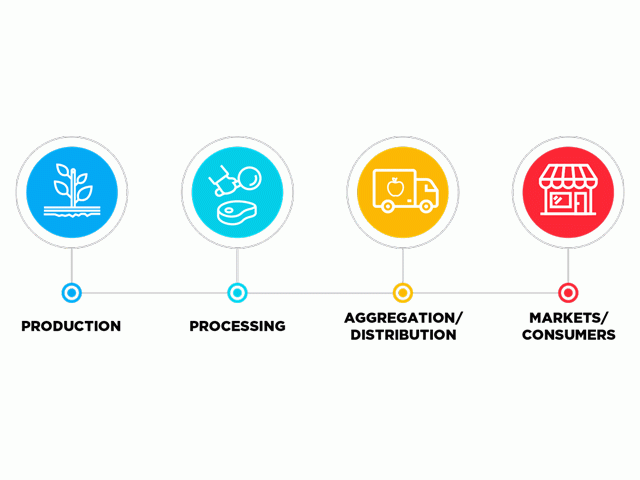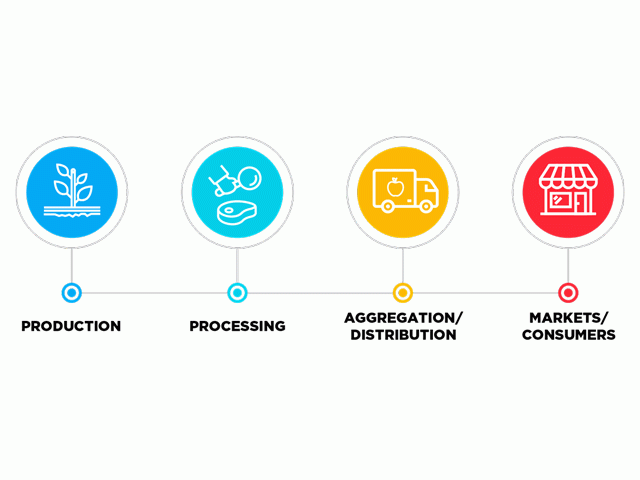Ag Policy Blog
Praise and Criticism for USDA's Framework to Transform Food Systems
Farm groups and others largely on Wednesday declared support for USDA effort to transform the food system, but Republican agricultural leaders in Congress weren't part of cheer section.
Agriculture Secretary Tom Vilsack spoke Wednesday at Georgetown University on challenges in food systems and need for change. He will travel Thursday to Ohio for an event with Rep. Marcy Kaptur, D-Ohio, a member of Congress for 39 years, but a new member of the House Agriculture Committee.
For details, See "Biden Administration Seeks to Transform, Strengthen the Food Supply Chain," https://www.dtnpf.com/…
Chuck Conner, president and CEO of the National Council of Farmer Cooperatives, introduced Vilsack before his speech. Conner, a Republican, said that over the past two years food and supply chains have been ""rocked by a series of once-in-a-generation events" including the pandemic, the war in Ukraine and a labor shortage, his members have persevered and learned that "we cannot take the strength of the supply chain for granted."
"Change is needed to strengthen it in the face of whatever future challenges we see as a nation," Conner continued. "That is why today's announcement on USDA's efforts to ensure resiliency, competitiveness and equity is so important to the future of American agriculture. Farmer co-ops stand ready to be a partner in these efforts and to help ensure that changes to the supply chain bring real benefits to farmers, consumers and rural communities.
Sen. Debbie Stabenow, D-Mich., chairwoman of the Senate Agriculture Committee, noted she had led efforts in Congress to secure $4 billion in funding for supply chain challenges.
"Americans have to access the healthy food they need no matter what," Stabenow said. "I'm pleased Secretary Vilsack is implementing my supply chain provisions to lower costs, and build a food system that is fairer for consumers and better for the men and women who power our food economy."
Rep. David Scott, D-Ga., chairman of the House Agriculture Committee, said USDA's announcement "will complement the House Agriculture Committee's ongoing efforts to tackle root causes of food and energy supply chain disruptions and provide relief to American producers and consumers. We have recently advanced legislation on these issues out of our committee and are working diligently to bring it to the House floor in the coming weeks."
Republicans were more critical of Vilsack's announcements. Rep. Glenn "GT" Thompson, R-Pa., said USDA's framework did not address the country's food or farm production challenges. "Increasing spending on organic initiatives and rooftop gardens while placing misguided blame on corporations and agribusinesses will not increase domestic food production," Thompson said. "Today's announcement blatantly ignores the skyrocketing inflation rates and input costs that are crushing America's producers, compounded by the Administration's burdensome regulatory overreach. There is no reason to use pandemic-related funds to 'transform' a food system that has long provided the safest, most affordable, and sustainable food and fiber supply in the world."
P[L1] D[0x0] M[300x250] OOP[F] ADUNIT[] T[]
Sen. John Boozman, R-Ark., ranking member of the Senate Agriculture Committee, also said there was nothing transformative in USDA's "proposal." Boozman added, "Much of this 'framework' is merely a repackaging of previously announced initiatives that will receive one-time funding provided for COVID relief," Boozman said.
Boozman added, "While the world is looking to the US for leadership and bold thinking, the Biden administration instead offers misplaced priorities and wishful thinking. Our global food supply system faces severe challenges that require serious responses. Today's proposal misses the mark and fails to meet the moment."
Rob Larew, president of the National Farmers Union, said USDA's framework ties into themes his members have long advocated.
"Farmers Union members have long known the importance of a strong and resilient food supply and a fair agricultural economy," Larew said. "Today's announcement by Secretary Vilsack about how the USDA will work to transform the food system is a great step towards those ends. NFU will work collaboratively with USDA to inform this transformative process."
Organic groups trumpeted USDA's announcement to spend $300 million to help producers transition to organic production. In his speech Wednesday, Vilsack noted the process for becoming organic is both "complicated and financially difficult, especially during the early days of transition." He said a "transformed food system" needs to reduce those barriers.
The Organic Trade Association pointed out organics is now a $63 billion market, but the industry needs farmers to scale up production to meet demand, said Tom Chapman, CEO and executive director of OTA. "USDA's new Organic Transition Initiative will jumpstart that growth by making the organic transition process more accessible and impactful; particularly for beginning and socially disadvantaged farmers and ranchers, who experience unique challenges to accessing resources and support programs. This historic investment in food production, which increases options for American farmers to 'adopt practices that are both good for their businesses and the climate,' is a significant win for our industry." Chapman said.
USDA's program will help farmers with the three-year transition to organic through mentoring programs, financial assistance tied to conservation, as well as some assistance with crop insurance as well.
Environmental Working Group also applauded funding to transition to organic production. "Organic still makes up less than 1 percent of farmed acres in the U.S.," said Scott Faber, EWG's senior vice president for government affairs. "Today's announcement will help more farmers transition to practices that no longer rely on toxic pesticides."
Faber added, "EWG applauds Secretary Vilsack for making the organic transition a priority, and for proposing new steps to help farmers earn a fair price, keep food and farm workers safe, and help consumers choose healthier diets."
John Piotti, president and CEO of American Farmland Trust, pointed to aspects of USDA's rollout that focus on increasing business technical assistance. AFT had organized an effort last year to encourage USDA to do more in this space. That included a call letter from 110 organizations and 50 members of Congress to highlight technical assistance. The Regional Business Development Centers along with funding from the American Rescue Plan will reflect more investment by USDA in technical assistance for small to mid-sized businesses.
"AFT and our partners provided input to USDA on the design of the Regional Food Business Centers, with a particular emphasis on the need for technical assistance to the farm businesses that represent the supply side of the food system," Piotti said.
The International Fresh Produce Association (IFPA) highlighted some of the programs likely to impact fruits and vegetables.
"We applaud the USDA on their ambitious approach shared in the 'Food System Transformation Framework' to achieve a more fair, competitive and resilient food system," said IFPA's Chief Public Policy Officer Robert Guenther. "We have seen a variety of global disruptions expose many weaknesses in our U.S. and global food system. We look forward to the rollout of the plan that will focus on creating a more sustainable and resilient system that recognizes the importance for farmers to remain profitable while also expanding access to nutritious food for all."
Chris Clayton can be reached at Chris.Clayton@dtn.com
Follow him on Twitter @ChrisClaytonDTN
(c) Copyright 2022 DTN, LLC. All rights reserved.






Comments
To comment, please Log In or Join our Community .